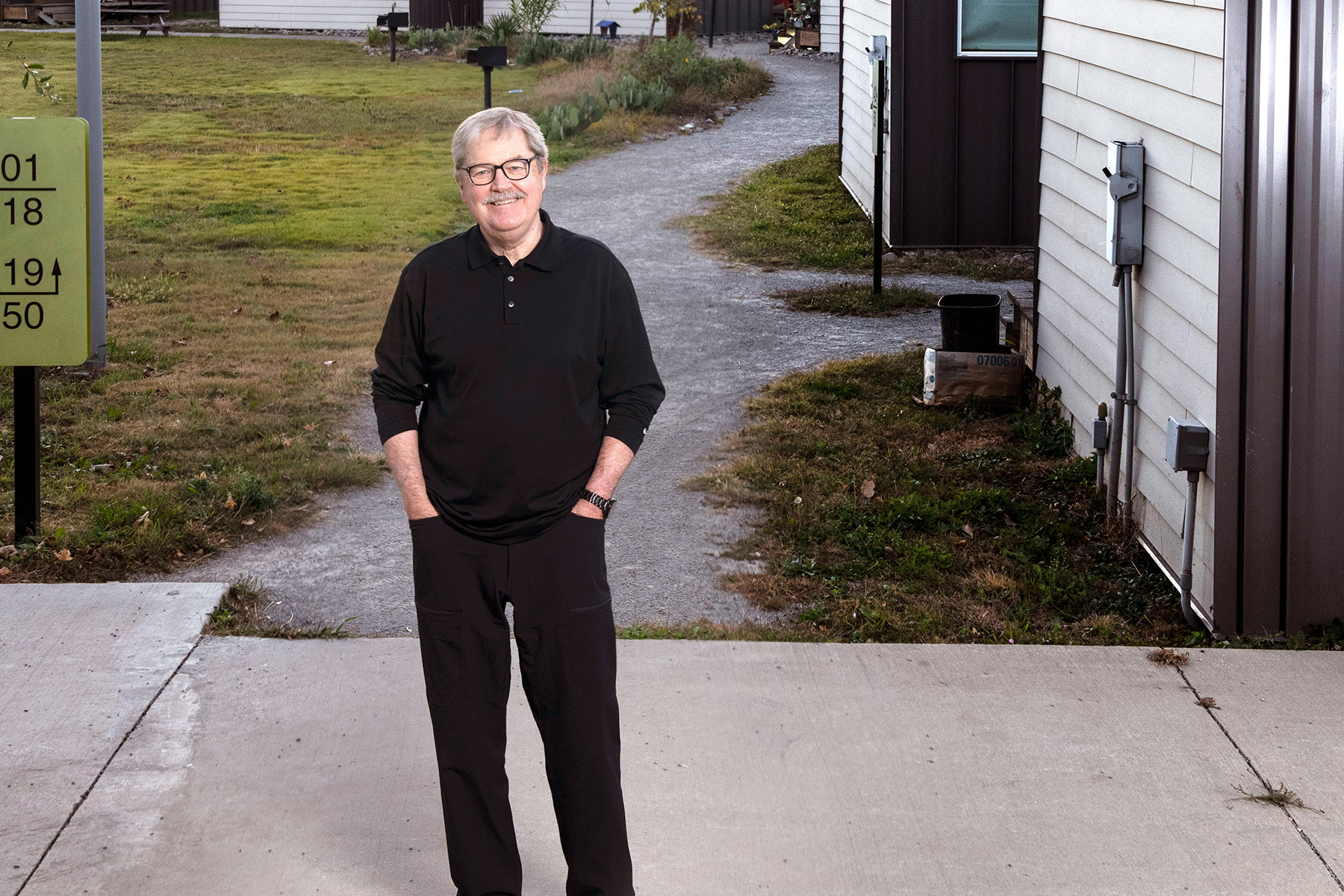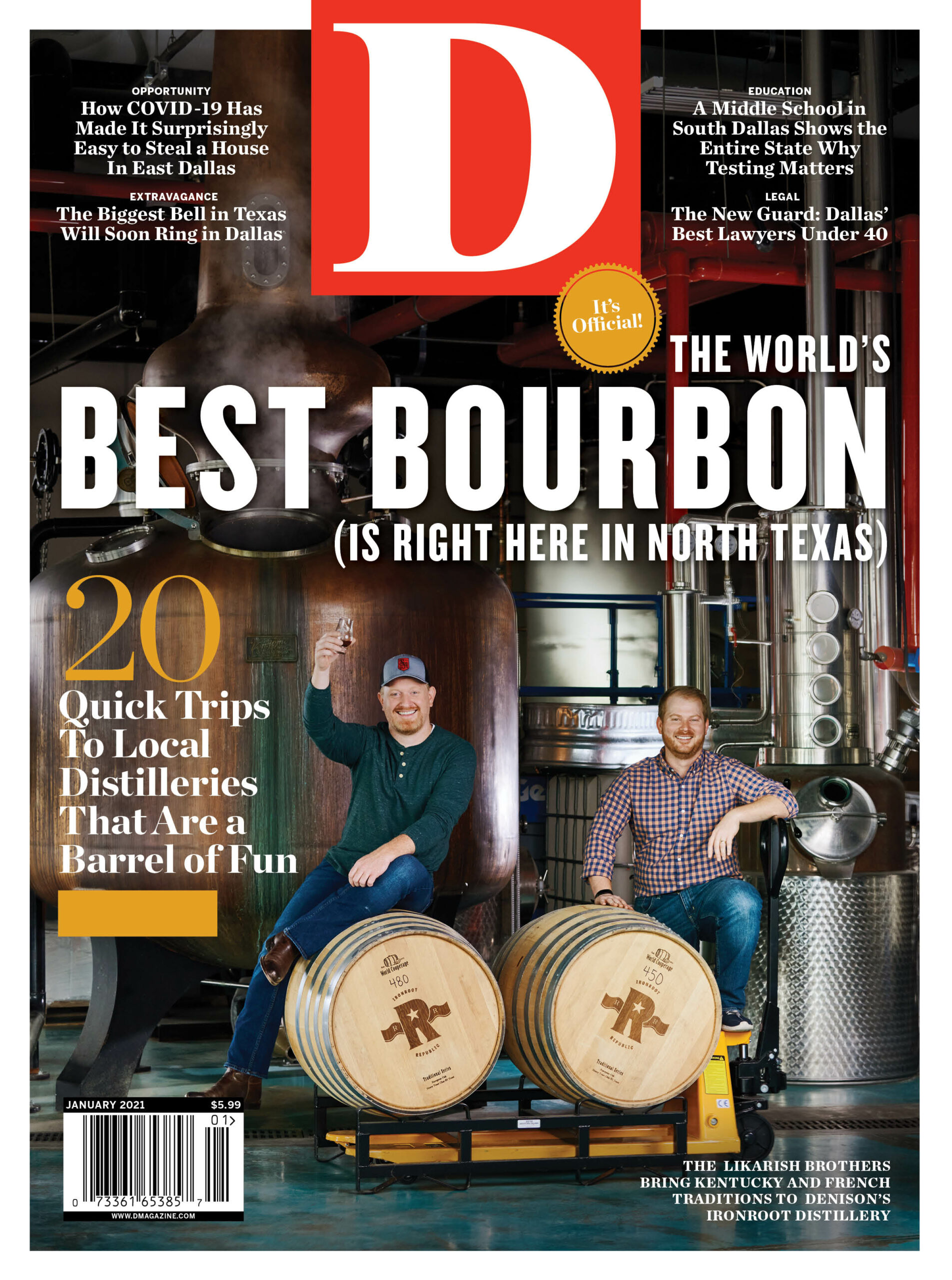In 1994, when Larry James began working at Central Dallas Ministries—now called CitySquare—he had no idea how to run a food pantry, let alone a nonprofit philanthropic organization. James, who was a senior minister at Richardson East Church of Christ at the time, studied theology and history at university. “I never had a social work class,” James says. “And the only business class I had was business law in the 10th grade.”
So James ran the organization in much the same way he saw other churches running outreach ministries. He solicited donations from the pulpit and volunteers from his congregation, and he steered those resources to the needy people who happened to show up at Central Dallas Ministries’ food pantry in East Dallas. For a while, it worked well enough. But then, one morning, James was trying to communicate with three Latina mothers who had come looking for help, and he kept coming up short. “I knew these women and their families needed something. I just didn’t know the details,” James says, citing what he calls his “abject stupidity when it comes to Spanish.”
That’s when he spotted Josefina Ortiz. Ortiz lived in the neighborhood near the food pantry and frequently sought assistance. James knew Ortiz was bilingual, and he asked her if she would step in to translate. Ortiz did more than that. Because she had been in these women’s shoes herself, she was able to connect with them about their circumstances. By the time they had finished, Ortiz and James had helped arrange assistance to pay rent and utilities for the three families. “I was literally on my knees, thanking Ms. Ortiz—she’s very short,” James says. “When she reached the door to leave, she turned back to me and said, ‘Larry, you know, I’ve got time on my hands. I can come back and help you if you need me.’ ”
This simple offer was a watershed moment. It prompted James to begin to believe that the way he thought about charity—the way most philanthropies approached charity—might be wrong. The traditional approach, he says, felt transactional, boxing up and delivering food in a manner that began to strike James as paternalistic. He had never considered that the very people his ministry served might possess the skills, talents, and vision needed to realize his organization’s mission. He called it “the wealth of the poor.”
“We changed our culture quickly after that day,” James says. “We added a question at the bottom of the interview form, which simply said, ‘We need volunteers to help us. Would you be willing to volunteer?’ We moved from having 20 volunteers a month to the highest I think we ever got to was almost 300 people from the neighborhood who came to volunteer.”
Over the past 25 years, James, who steps down from his role heading CitySquare this month, grew the modest food pantry into a powerhouse in the fight against poverty and homelessness. By responding to the needs and ideas voiced by the people it serves, CitySquare became an affordable housing homebuilder, a homeless shelter, a community legal resource, a medical clinic, the operator of an AmeriCorps-style job program, the redeveloper of the historic Forest Theater—the list of the organization’s accomplishments goes on and on.
As CitySquare grew, James emerged as one of the most enduring and outspoken advocates on behalf of Dallas’ indigent and homeless communities, sounding the alarm at City Hall about the city’s deepening levels of income inequality and dire affordable housing shortage years before politicians began to pay serious attention to the problems. He was an unlikely champion of the city’s poor. He is a soft-spoken minister with a slow drawl, neatly parted gray hair, and a white mustache that sits flat on his lip. You might expect to find James at a meeting of a bank’s board of directors rather than wandering some of Dallas’ toughest streets looking for volunteers among the homeless.
He grew up in Richardson, where his father was city secretary. Studies took him to Abilene and New Orleans, but James moved back to Richardson to join the Church of Christ. There was always an outreach element to James’ work with the church. He led a Richardson-sponsored anti-poverty program in the early 1980s and worked with HIV patients during the early days of the AIDS epidemic. But his work with CitySquare drew him away from the suburbs and into the life of the city, and he and his wife eventually moved to East Dallas. As James became known as one of the leading voices in the fight against homelessness and poverty, former Dallas mayors Tom Leppert and Mike Rawlings tapped him to lead their anti-poverty efforts.
One of James’ overlooked legacies, however, is pioneering a philanthropic model that is, in many ways, an inverse of the typical way charitable giving is managed. Philanthropies often take a top-down approach to creating and executing their mission, relying on the vision of patrons to drive approaches to giving.
Often, this means that those who are supposed to benefit from charitable efforts don’t have a voice in shaping the kinds of benefits they will receive. Arts patrons, for example, can sometimes display an adversarial relationship with artists. Despite generations of fundraising around the Trinity River Project, environmentalists still struggle to have their insights into and concerns about the future of the river’s ecology taken into consideration. The same is true with poverty and homelessness. “We listen to people that are expert, quote unquote,” James says. “We don’t really listen to people who are poor. At some level, I think we’re afraid of each other.”
James’ bottom-up approach to philanthropy hasn’t always been easy, and it has come with no shortage of setbacks. For example, CitySquare once attempted to launch a solar power company to provide electricity to homeowners in southern Dallas but never got the effort off the ground. In the early days, tapping community members to volunteer sometimes meant items would go missing from the pantry. But James believed these were small prices to pay for operating in a way that wasn’t just about meeting a community’s material needs but also utilizing community members’ time and efforts in a system of mutual exchange that could help restore a sense of personal agency and dignity.
“It led to this principle of reciprocity,” James says. “If everyone’s not giving, and everyone’s not receiving, we’re on the wrong pathway.”
James also learned that philanthropy has limits when it comes to addressing the city’s systemic social injustice. CitySquare piloted a housing-first homelessness program, a model that has proven successful in other cities, by building a community of cottages south of downtown to house the most high-risk members of the homeless population.
But without the public resources to expand the community, the cottages are a drop in the bucket. James’ nonprofit may have created a community work program that helped put money in unemployed people’s pockets during the holidays, but not at a scale that could compensate for the vast numbers of people who are underemployed. A community health clinic cannot substitute for universal healthcare. And while James has converted hotels into affordable housing units and developed shelters for the homeless, the city still faces an affordable housing shortage. “To have one child and a one-bedroom apartment in Dallas County, you need to be making $16.81 [per hour],” he says. “That’s not happening, and so no wonder people are in trouble.”
Fixing this, James believes, will require a mobilization of public resources at a scale on par with the Marshall Plan, which rescued Germany’s economy after World War II. James believes the capacity for such a public mobilization against poverty exists—that even relatively small direct public investments, like the idea of a universal basic income advocated by Andrew Yang during the 2020 presidential campaign, could radically transform people’s lives. “What would happen,” James asks, “if you sent every family in Dallas $1,000 for every person under their roof?”
If the public resources exist to fight poverty, what is missing is the will. James says he will spend the coming years advocating for and writing about the need for large-scale public responses to issues of social justice. But as he leaves CitySquare, there are some indications that the wider philanthropic and faith communities are beginning to recognize the effectiveness of the example the organization set under James’ leadership.
Dr. John Siburt, CitySquare’s COO, who will take over running the organization as James steps down, says he is seeing an evolution in the philanthropic community. “You can’t really spray and pray—$25,000, $50,000 gifts all over town—and get much impact,” Siburt says. “We’re starting to see funders understand the need for deeper investment and more long-term investment.”
It’s a lesson James has been trying to drive home for 25 years. Macro social problems like poverty and homelessness are best addressed by zeroing in on the way they play out on the micro scale of people’s day-to-day lives. Creating systemic change to systemic problems begins by ceasing to see these issues and the people affected by them as abstractions, statistical challenges, sociological conditions, or civic shames, and to instead see poverty as a lived reality and “people in need” as neighbors who have much to contribute. Like Josefina Ortiz.
Write to [email protected]. This story originally appeared in the January issue of D Magazine with the headline “Wealth of the Poor.”






